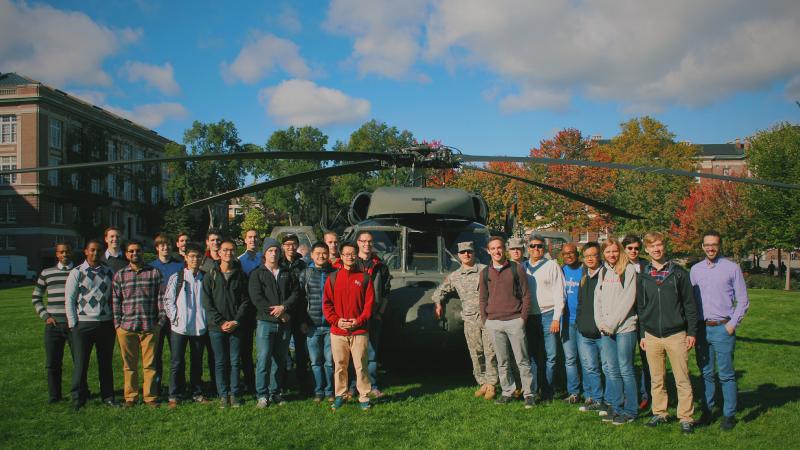Two-day event with national speakers will kick off opening of new center Oct. 2-3
September 27, 2018

A new research center focused on vertical flight has been launched at Rensselaer Polytechnic Institute. Under the leadership of Farhan Gandhi, the Rosalind and John J. Redfern Jr. ’33 Professor of Engineering, MOVE—The Center for Mobility with Vertical Lift—will pursue cutting-edge research in vertical takeoff and landing (VTOL) aircraft technologies.
Rensselaer will kick off the new center with a two-day symposium October 2-3. The event will include lectures and a panel discussion by representatives of industry, government, and academia, and will include a tour of MOVE and a viewing of a Black Hawk helicopter flying out from the ’86 Field on campus.
A ribbon-cutting ceremony will take place on Wednesday, Oct. 3, 2018, at 9:30 a.m. in the Center for Biotechnology and Interdisciplinary Studies.
Vertical lift technology is undergoing a major renaissance, according to Gandhi, an expert in rotorcraft aeromechanics and advanced VTOL configurations. On the one hand, driven by the military’s needs, there is interest in configuration advancements leading to efficient VTOL aircraft that are capable of significantly higher cruise speeds.
“On the other hand, there is a tremendous buzz around the emergent field of multi-rotor electric VTOL, or eVTOL,” said Gandhi. A new class of both electric and hybrid electric aircraft is envisioned for a range of applications, he said, from package and payload delivery to air taxis.
“Enabled by the use of distributed electric propulsion, with piloted as well as autonomous operation, eVTOL aircraft have the potential to completely change the mobility paradigm.”
Symposium speakers include Mark Moore, director of engineering for Uber Elevate, which has launched a project to develop a network of eVTOL aircraft to provide transportation for commuters in big cities. He will present the Lila and Robert G. Loewy Lecture: “The Dawn of eVTOL.”
Jeff Singleton, director of technology for the U.S. Army, will deliver the Paul E. Hemke Lecture: “New Forces Shaping Research and Development in the U.S. Army,” and Mike Hirschberg, executive director of the Vertical Flight Society, will speak about “The Electric VTOL Revolution.” Steve Weiner, from the Rensselaer Class of 1978, chief engineer of the JMR-Defiant at Sikorsky Aircraft Corp, will present “Design Considerations for Vertical Lift Mobility, or Things to Think About Before You Grow Your Drone.”
Panelists from such companies as Bell, Terrafugia, Aurora Flight Sciences, and Boeing, as well as the Army Research Laboratory and the University of Maryland, will discuss the current status and technical challenges of electric VTOL.
Gandhi, who joined Rensselaer as an endowed professor in 2012, is known internationally for his research on active helicopters, advanced vertical lift configurations, and adaptive structures and reconfigurable systems. He is the author of 260 technical papers and has received numerous awards, including an Army Research Office Young Investigator Award, the Francois Xavier Bagnoud Award from the Vertical Flight Society (formerly the American Helicopter Society), a Popular Mechanics Breakthrough Award, and the 2018 American Institute of Aeronautics and Astronautics Faculty Advisor Award. In 2013, Gandhi was elected a Technical Fellow of the Vertical Flight Society.
Joining Gandhi in research activities at MOVE are nine additional Rensselaer faculty members and two affiliated faculty with a collective expertise in VTOL aeromechanics, multi-copters, advanced VTOL configurations, control and autonomy, flying qualities, diagnostics and structural health monitoring, computational fluid dynamics, experimental aerodynamics, nanomaterials, and design optimization. The center currently has 21 Ph.D. students.